- Home
- Lin Carter
The Quest of Kadji Page 4
The Quest of Kadji Read online
Page 4
By contrast, Kadji was bone-dry, silent, and he breathed shallowly, showing no sign of exertion. Nor had he once taken a stroke with his great steel Axe, but restrained himself to merely warding off or turning aside the strokes of his opponent. This, though none but he knew it, was the silent vow he had made to his warrior Gods before entering the contest: that if he must employ the Sacred Axe in so lowly a combat, he would merely use it to defend himself, not to slay.
Around and around the long table they went, Jashpode panting gustily, dripping sweat; the Nomad youth as silent as a stalking panther. The boy had fought many hours with the axe and the sword, for the double-bladed war axe was one of the favorite weapons of the Kozanga Nomads; he knew that it had certain advantages against the sword—especially the sabre, which is slim and curved and can only be used to slash—and he was awaiting the proper moment to employ the weapon in a manner ho knew. But it must be just the right moment.
It came: He caught the other’s blade and twisted his wrist, allowing the glistening curve of steel to slide up the axeblade to the hook at its peak; therein it caught firmly, and he twisted his wrist very suddenly, the other way.
The narrow curving blade snapped in two pieces with a ringing clash that filled the hall. And Jashpode was disarmed.
Now, according to the code of the duel; as fought in the realms of the Dragon Emperor, it was well within the rights of Kadji to slay the other man. Instead he saluted politely and returned the Axe to its place beneath his fringed cloak, then turned away, taking the old wizard by the arm to escort him to his room, leaving the kugar behind, bare-handed, weaponless, weak with exhaustion and trembling with inarticulate fury.
All the way up the wooden, stair the fat little wizard marveled at the prowess of Kadji the Red Hawk. And the youth answered the old man politely but modestly.
Thus it was that on the first day of entering the city of the Dragon Emperor, Kadji, Red Hawk of the Kozanga Nomads, made a friend.
And an enemy, too. For he had affronted the honor of Cyrib Jashpode, and that honor could be cleansed only in scarlet blood.
iv. Akthoob
THE NEXT day Kadji continued his tour of the magnificent city and even the desperate importance of his Quest did not deter him from admiring the splendor that lay about him to either side. For thirty centuries of time golden Khôr had ruled these lands, and in all those ages it had drunk deep of the rivers of gold that poured through the hands of its merchants and landowners. Emperor after emperor had added new jewels to its crown, until by This age it was a splendor of arch and forum, temple and theatre, colonnade and sepulchre. Broad, level avenues were lined with heroic statuary; memorials to triumphant and fabulous wars, the glories of long-dead monarchs and extinct dynasties.
At evening he made his way back to the House of the Seven Moons, but before he had even reached that quarter of the city he was fortunate enough to catch a glimpse of the man whose death was the goal of his Quest and the sacred duty laid upon him by the Lord Chieftain of the Chayyim Kozanga.
There was a crash of golden trumpets; heralds armed with ceremonial whips rode clattering through the street and the throng of citizens rapidly drew to the sides thereof, and among them was Kadji. A moment later a troop of mounted and gaily caparisoned nobles rode past, laughing and jesting, and amidst them all, one tall golden man shone. He was serene and beautiful, with a cold, sculptured face and ice-grey eyes, and when he laughed, as he did both often and loudly, Kadji saw that the laughter did not reach beyond his lips, for his eyes remained frozen and watchful and arrogant. Thus he was watched as Yakthodah the Holy Dragon Emperor rode past under a cloud of fluttering banners in the noontide of his glory.
As he passed, on his way to an evening of revelry at the theatre or the hippodrome, he turned by chance and his arrogant, icy gaze flickered over Kadji’s face. For a single instant they stared into each other’s eyes, the traitor and the avenger, before the Dragon rode on. And the keen eyes of Kadji noted that the cold beautiful face of the Emperor bore a strange small flaw. Directly below the corner of his mouth was a bright scarlet mark the shape of a tarisk leaf.
And then the Emperor was past the place where Kadji stood, and Kadji noted with widening eyes the curious and horrible creature who rode at the Emperor’s back.
It was no man but a monster with the broad, sloping shoulders of a giant and the long powerful, dangling arms and short, bowed legs of an ape. The thing went naked save for a harness of belted straps, and with amazement Kadji saw that its body was covered with glittering snake-scales, sapphire blue. It had a hideous broad hairless bead, thrusting forward from bowed, enormous shoulders, neckless, noseless, scaled blue, with weird eyes of dull scarlet. In his astonishment, the boy uttered an ejaculation.
The man who stood next to him in the crowd chuckled at his cry of revulsion. “ ‘Tis naught to fear, young sir, for that is Zamog, the Holy Emperor’s familiar, as we call him—one of the Dragomnen of the Swamp Country. They say he is as intelligent as an ordinary man and utterly devoted to his master.”
Kadji turned to murmur polite thanks to the man beside him and recognized him for the small, timid Easterling wizard he had saved from the bullying of Cyrib Jashpode the evening before.
The wizard nodded and grinned: “Aye, young sir, I knew you at a glance, and could not help speaking, for still this lowly and insignificant one owes you a debt of gratitude for your gallant and chivalrous deed! I am Akthoob of Zool, a minor practitioner of the Art Sorcerous and Magical, drawn hither to perform my small and unimpressive craft before the Holy Emperor, whom, or so this person has been told, delights in exhibitions of magic, and has a liberal hand with gold for those fortunate enough to entertain him! But, come, if you are on your way back to our mutual hostelry, let us walk together, and perchance you will permit this person to join you at supper, so that we may converse further and at our leisure… .”
KADJI FOUND the garrulous old wizard amusing and informative company. Over a fine dinner of jellied eels and spicy herb broth that evening he drew the fellow out. Akthoob, as was his name, had never been in golden Khôr ere this, but knew it well from converse with other magicians in his coventicle. Like all of his Easterling race, Akthoob was loose of tongue and thus it was not difficult to guide the conversation in the directions Kadji desired. Passing himself off as one Ioga of Yuzan, a Free Sword or mercenary-for-hire, come from the territories of the Ushamtar Nomads, Kadji expressed the curiosity concerning the city and its emperor proper in an outlander but new-come to the mighty capitol.
Akthoob, he learned, had already applied to the Chamberlain for permission to enter the sealed gates of the Khalidûr and perform magic before the Imperial court. His pass was dated two nights hence.
Their meal done, and Kadji yawning with sleepiness, they parted—effusively wishing the young warrior a good rest, old Akthoob went to his chamber and Kadji to his own. But not to sleep. The Easterling wizard had described the hundreds of alert and wary archers and swordsmen who guarded every portal of the Khalidûr, and Kadji lay awake far into morning, his brain bewildered, examining first this plan and then the next. When finally he dropped into an uneasy and fitful slumber, it was on a hopeless note.
There seemed to be no way he could enter the palace and strike down the Impostor.
v. The Flamehaired Girl
THE NEXT day dawned with dim ruddy light filtering through a fall of snow. The air was crisp and biting cold, and Haral stamped and neighed, its breath a plume of vapor on the frosty air as Kadji led the black pony from its stall.
Hooves crunching on crusted snow, they rode the circuit of the city that day while the Red Hawk continued his explorations. This day he had set aside for studying the gates of the city, their number and positioning, the approaches thereto, and the manner in which they were under guard.
Returning toward sunfall when Kylix was a disc of red gold sinking, behind the towers of the western quarter of Khôr, the Nomad boy made a strange discovery.
As he guided his pony into the long Avenue of the Hippogriffs that led to the House of the Seven Moons, a young woman was borne past him in a princely palanquin veiled in gauzy silks and carried by strong slaves in gold-and-purple livery.
The inquisitive youth had studied the nobility of Khôr. He knew that the kugars, the greedy class of great landowners, used no livery; being wealthy but not armigerous, The Emperor permitted a blank white escutcheon to the kugar class as a whole, but only the old Imperial baronial families bad the distinction of color liveries. And gold-and-purple, he knew, were the colors borne by an ancient family close to the dynasty currently regnant: a royal house, however, considered extinct.
Thus his attention was drawn to this closely veiled palanquin through curiosity, and by this chance he was able to observe something he might easily otherwise have missed.
Just as they drew together, side by side in the stream of traffic, the slaves bearing the palanquin slipped in an area of slick, icy wet snow, and staggered for a moment. This caused, the flap of the veils wherewith the sides of the palanquin were draped to fall back, revealing the features of the personage who rode within.
For a single flashing instant of time Kadji found himself gazing straight into smoky eyes of amberous gold, huge dark-lashed eyes set in a clear tanned oval faces framed in a gorgeous mane of flamy-golden hair.
It was the girl he had seen in Nabdoor, to the very life!
His eyes widened in surprise, and he caught, in that flashing instant before the flap fell back, a similar expression of surprise on the girl’s face. She had recognized him, as well.
He reined up his black Feridoon pony and watched the palanquin go by in bafflement. The girl he had seen in Nabdoor had gone unattended save by a monstrous grey plains-wolf. And she had been dressed in ragged and voluminous garments like a wandering Perushka wench But this girl rode like a princess, and her slim young body was sheathed in expensive silk, and pearls, the great blond pearls of Nizamar, had been woven like a net through her glorious tresses, and a great green opal had glowed at her brow.
Surely the two girls were one and the same—or were they?
On sudden impulse, he guided Haral aside to follow in the wake of the veiled palanquin. It turned in to a courtyard much overgrown and where the ruins of a garden grown wild lay dead and black and tangled beneath the deathly fall of the filtering snow.
The mansion that rose in tiered height beyond the walled courtyard was splendid and ornate, virtually a palace. But it was festooned with dead vines and the carven stonework at balcony and architrave was weather-stained. Such dilapidated grandeur in decay could have been caused only by long years of neglect … as if the mansion had stood empty and unattended for some space of time.
At the corner of the street whereon rose the mansion, Kadji found a small wineshop; he tethered his shivering pony to the wooden bar at the door and went in and ordered a tankard of ale, mindful of his shrinking purse.
Those who frequented the wineshop were, he saw, grooms and squires, gardeners and servants employed hereabouts, and thus a reservoir of gossip. He unlocked their tongues by buying a drink for all, for the moment pretending to be a genial mercenary swordsman on a drinking spree. Before long he learned that the mansion was the House of the Turmalin, that it had in truth stood deserted for many years, since, in fact, the death of the last Emperor, Azakour, some twenty years before. The Lady of the Turmalin had fled the city during the struggles of dynastic succession, and had taken up her abode in a far province.
“But surely the noble maiden I glimpsed going in just now is too young to have deserted Khôr twenty years ago!” Kadji said.
One of the grooms winked and nodded.
“Aye, this be her daughter, the Lady Thyra, new come from the provinces,” he said.
And that was all Kadji could discover. He rode back to the House of the Seven Moons through the blowing snow, deep in thought. Was the girl of the palanquin the same girl be had seen as a ragged Perushka in the traders’ town far to the south? They were alike as sisters, nay, more so: Kadji was convinced they were one and the same.
But why this should bother him, he could not discern. What was it to him that a strange and beautiful girl had been in Nabdoor some days ago, and now was here in mighty Khôr?
The snow was thicker now. Great parties of kugars were moving through the slushy streets in the direction of their quarter, which ringed the central Khalidûr like a half-moon. All day he had seen the kugars gathering into the capital and had thought but little of it, save to keep a wary eye out for the Highborn Cyrib Jashpode, the young kugar lordling whom he had angered and fought, and with whom he guessed there would yet be a final reckoning.
He dined alone that evening while the snow storm rose and raged beyond the shuttered windows. The friendly Easterling wizard, Akthoob, was not in evidence this night. And as the bony and talkative little old man was the closest thing to a friend he had yet made in this vast, bewildering, many-peopled metropolis, the Nomad boy felt oddly lonely as he ate his meal alone.
There was shouting in the streets and many horsemen rode by and the sound of blown bugles somewhat later, but the boy Kadji, nursing a frugal jack of ale with a full belly beside the warm hearth, paid no attention. Then, toward the first hour after midnight, the inn door came crashing open with a blast of icy air sand a flurry of swirling snowflakes, and the Easterling Akthoob, came in, white from head to foot with snow, his pointed nose, blue with cold, his slitted eyes watering, blowing on his frozen hands and stamping the caked snow from his fur-covered buskins.
Kadji hailed him. “Come, friend, share the fire and a jack of ale, for the uight is cold and dark.”
Suppressed excitement glittered in the slant black eyes within that long sallow face.
“Colder and darker than you think, young sir,” replied the little wizard in tense low tones.
“What do you mean?”
“The kugars have arisen. Holy Yakthodah lies dead in the Khalidûr, cut down by a kugar knife. And a kugar council rules golden Khôr this night!”
vi. The Death of the Dragon
ERE DAWN the word had sped to every corner of Khôr and not a miserable beggar shivering in his hovel but knew that the last legitimate heir of the dynasty was slain, that the great House of Azakour was extinguished at last, and a grim and bloody time of troubles had come upon the Dragon Empire. The savage and merciless struggle for power would begin now, and there were many men of Khôr who could well recall the terrible days that followed the death of Azakour Third twenty years agone, and how all of the Plains had been torn asunder by civil war until the discovery of a legitimate heir—even that same Yakthodah who lay now in state in the Throne Hall.
The facts behind these bloody and swift-moving events were easy to unravel. The kugars had seized power after the death of the Emperor Azakour, and only an army of Rashemba knights, lent to the Pretender, Yakthodah, by his supporter and father-in-law, the High Prince Bayazin, had driven the greedy kugars from the place of power. The Nomad warriors of the Great Plains had aided in that war, but no sooner had they assisted in establishing Yakthodah in his father’s holy throne, than the fickle Emperor, discovering he needed the friendship and the fat purses of the kugars to sustain him in the life of revelry and license he desired, had welcomed back with open arms the rich and powerful landowner class. From this point things had gone from bad to worse, even to the point of alienating, then outlawing, and finally making war against the stout and loyal-hearted Nomads.
But the kugars were not completely satisfied. They feared the influence of Bayazin, and the strong hold he had on the pleasure-loving Yakthodah. And recent news that Bayazin, with an army of his mighty Rashemba knights, was, now moving upon Khôr—ostensibly to pay a visit of state upon his royal son-in-law, and also to garrison the heartlands about Khôr. against the long-expected revenge of the Kozanga Nomads—drove the jealous and fearful kugars into open rebellion. Yakthodah had been assassinated by night in his own Throne Hall,
and kugar mercenaries now held the Khalidûr fortress, and the gates of Khôr itself against the expected siege of Prince Bayazin.
In all the turmoil and chaos that made the very world echo to the collapse of dynasties and the battle of opposed regimes, what of the boy Kadji, Red Hawk of the Chayyim Kozanga Nomads, and his sacred Quest to avenge upon the body of the man the world believed to be the True Emperor the stained honor of the Kozanga war clans?
What indeed? It would seem that a kugar blade had spared him the task his grandfather had set upon his shoulders.
He made up his mind swiftly, for time was very important: by noon, it might be, Khôr would be in a state of siege. If he were to act at all, be must do so now.
“Akthoob, have you still that pass which permits you entry into the Khalidûr?”
The old wizard shrugged bony shoulders. “This humble person has it here in his purse, young sir, but what good? I shall not now use it, as the Holy Dragon Emperor before whom I would have performed my small arts lies now stark and cold as last morning’s bacon… .”
“Does the pass describe the purpose of your visit?” Kadji pressed urgently through the fog of words.
“No, no indeed: it merely says that one Akthoob of Zool is given permission to enter into the Khalidûr and to come into the Throne Hall …”
“And it is dated?”
“Aye, young sir, but why all these questions? Oh, very well! It bears tomorrow’s date, as I told you when we talked …”

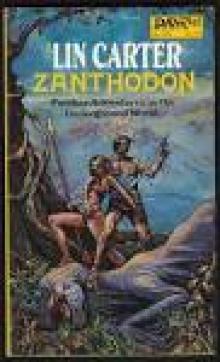 Zanthodon
Zanthodon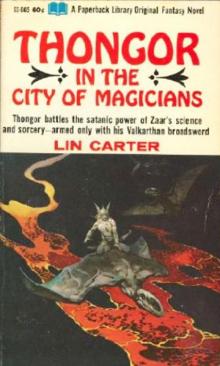 Thongor in the City of Magicians
Thongor in the City of Magicians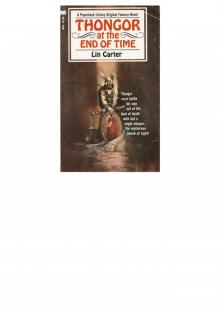 Thongor at the End of Time
Thongor at the End of Time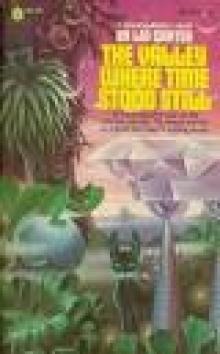 The Valley Where Time Stood Still
The Valley Where Time Stood Still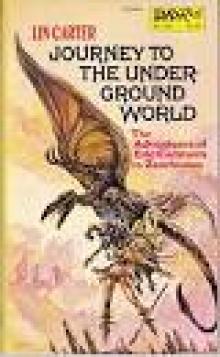 Journey To The Underground World
Journey To The Underground World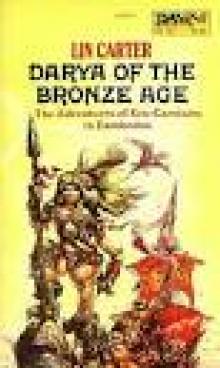 Darya of The Bronze Age
Darya of The Bronze Age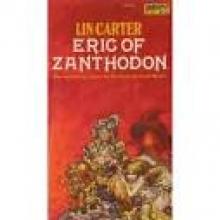 Eric of Zanthodon
Eric of Zanthodon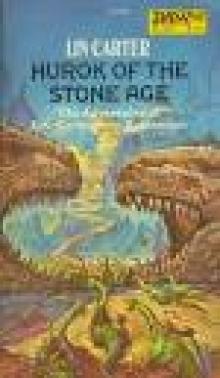 Hurok Of The Stone Age
Hurok Of The Stone Age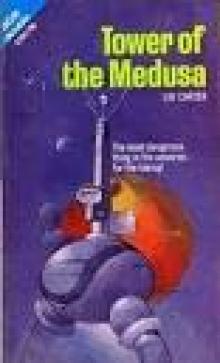 Tower Of The Medusa
Tower Of The Medusa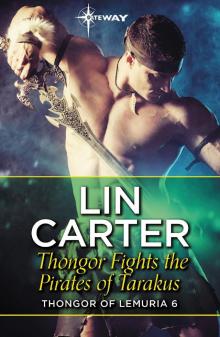 Thongor Fights the Pirates of Tarakus
Thongor Fights the Pirates of Tarakus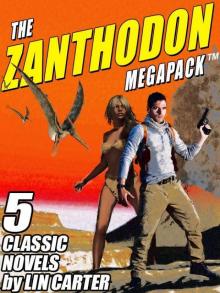 The Zanthodon MEGAPACK ™: The Complete 5-Book Series
The Zanthodon MEGAPACK ™: The Complete 5-Book Series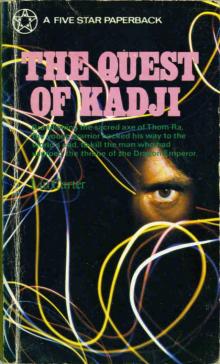 The Quest of Kadji
The Quest of Kadji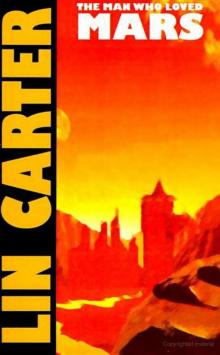 Lin Carter - The Man Who Loved Mars
Lin Carter - The Man Who Loved Mars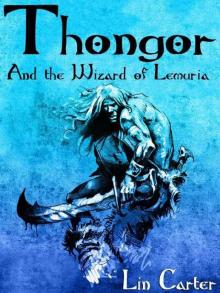 Thongor and the Wizard of Lemuria
Thongor and the Wizard of Lemuria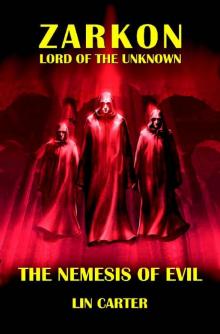 The Nemesis of Evil
The Nemesis of Evil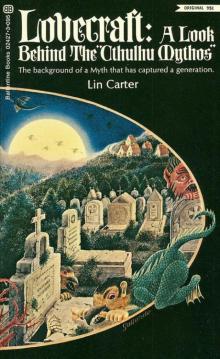 H.P.Lovecraft: A Look Behind Cthulhu Mythos
H.P.Lovecraft: A Look Behind Cthulhu Mythos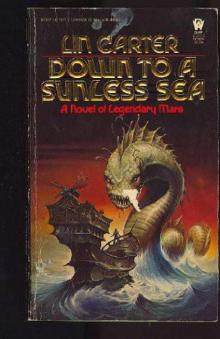 Lin Carter - Down to a Sunless Sea
Lin Carter - Down to a Sunless Sea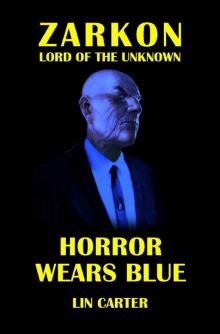 Horror Wears Blue
Horror Wears Blue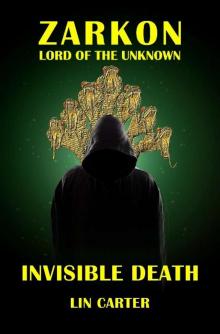 Invisible Death
Invisible Death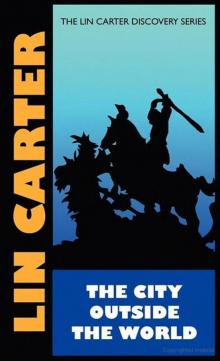 Lin Carter - The City Outside the World
Lin Carter - The City Outside the World The Volcano Ogre
The Volcano Ogre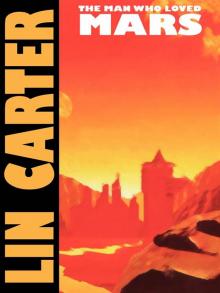 The Man Who Loved Mars
The Man Who Loved Mars